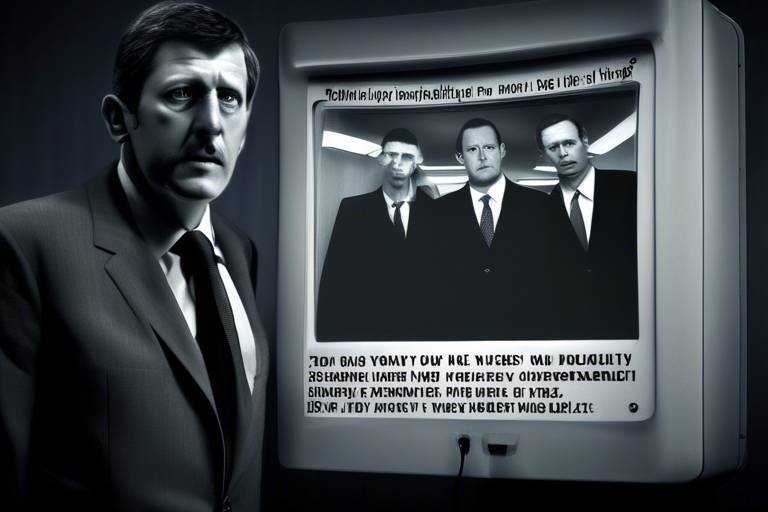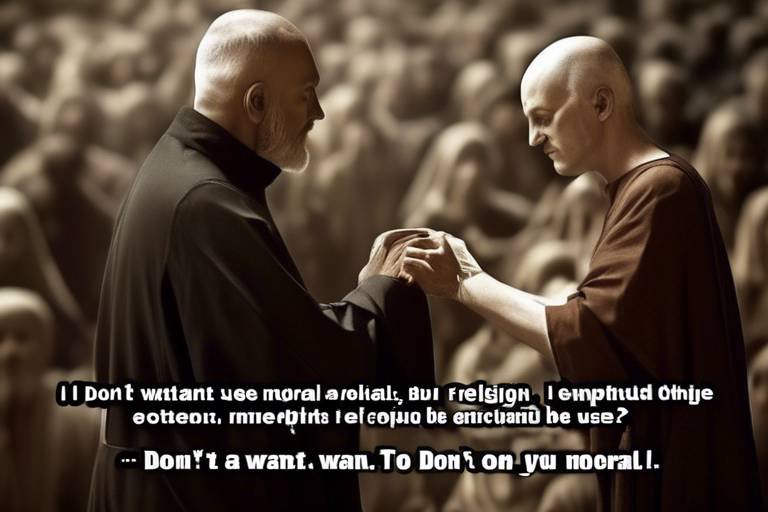Can Morality Exist in a World Without Truth?
In a world that often feels chaotic and uncertain, the question of whether morality can exist without truth looms large. It's a thought-provoking inquiry that challenges our understanding of ethics, guiding principles, and the very fabric of society. Imagine a ship sailing without a compass; it may float, but without direction, it is bound to drift aimlessly. Similarly, can we navigate our moral landscape if we strip away the foundational truths that guide our choices? This article delves into the intricate relationship between morality and truth, exploring whether ethical principles can stand independently in a reality devoid of objective truths.
To grasp the essence of morality, one must first explore its definitions and origins. Morality is often described as a system of principles that govern our behavior, helping us distinguish right from wrong. But where do these principles come from? Are they inherent within us, or are they shaped by external influences? Various moral philosophies offer different insights:
- Deontological Ethics: This perspective argues that actions are inherently right or wrong, regardless of their consequences.
- Consequentialism: Here, the morality of an action is judged based on its outcomes.
- Virtue Ethics: This approach emphasizes the character of the moral agent rather than specific actions.
These frameworks shape our ethical standards and influence how we interact with one another. However, the question remains: can these moral standards hold weight in the absence of objective truths?
Truth is often viewed as the cornerstone of understanding reality. It serves as a foundation upon which beliefs and actions are built. Yet, truth itself can be elusive, with various interpretations shaping our perceptions. Philosophers have long debated the nature of truth, leading to several perspectives:
- Correspondence Theory: This theory posits that truth is what corresponds to reality.
- Coherence Theory: Here, truth is defined by the coherence of a set of beliefs.
- Pragmatic Theory: This approach suggests that truth is what works in practical terms.
Understanding these interpretations is crucial, as they significantly influence our beliefs and guide our actions in a complex world.
Throughout history, philosophers have grappled with the coexistence of morality and truth. The debate often centers around two camps: moral relativism and moral absolutism. Moral relativists argue that moral truths are not universal but instead shaped by cultural and individual perspectives. In contrast, moral absolutists maintain that there are fixed moral truths applicable to all people, regardless of context. This philosophical tug-of-war raises critical questions about the nature of ethics in a world where truth is subjective.
Can moral values truly exist independently of objective truths? This provocative question invites us to consider the implications of subjective morality. If each person defines morality based on personal beliefs, we risk entering a realm of ethical chaos. Imagine a society where everyone follows their own moral compass without a shared understanding of right and wrong. The potential consequences could be profound:
- Increased conflict and division among individuals and groups.
- Challenges in establishing laws and social norms.
- Difficulty in resolving moral dilemmas, leading to paralysis in decision-making.
As we ponder these implications, it's clear that the absence of a common moral truth could lead to societal fragmentation.
Cultural influences play a significant role in shaping moral beliefs. Different cultures define morality in unique ways, often leading to diverse ethical standards. For instance, what is considered acceptable in one culture may be taboo in another. This cultural relativism raises questions about the universality of moral principles and highlights the importance of understanding cultural contexts in moral discussions.
The ambiguity of moral standards can lead to confusion and conflict. In a world where morality lacks a common truth, individuals may struggle to find common ground. This can result in:
- Social unrest and increased polarization.
- Difficulty in establishing laws that reflect the will of the people.
- Challenges in fostering mutual understanding and respect among diverse groups.
As we navigate these complexities, it becomes evident that a shared moral framework is essential for societal cohesion.
Real-life moral dilemmas often highlight the complexities of ethical decision-making. Consider the case of a doctor faced with the choice to save one patient over another due to limited resources. This scenario illustrates the challenges of making moral decisions in a truth-deficient landscape. Each choice carries weight, and the lack of a clear moral guideline can complicate the decision-making process.
Finding shared moral principles is crucial in a diverse society. Efforts to establish common moral ground often involve dialogue and understanding, allowing individuals to bridge gaps despite differing beliefs about truth. Initiatives that promote empathy and respect for diverse perspectives can help foster a more cohesive moral landscape.
As society evolves, so do notions of morality. The questioning of absolute truths may lead to new moral frameworks that emphasize flexibility and adaptability. However, it is essential to remain vigilant about the potential consequences of moral ambiguity. By engaging in open dialogue and striving for common understanding, we can navigate the complexities of morality in an increasingly pluralistic world.
Q: Can morality exist without truth?
A: While some argue that morality can be subjective, a shared understanding of truth often underpins ethical principles.
Q: What are the implications of moral relativism?
A: Moral relativism can lead to increased conflict and difficulty in establishing a common moral framework.
Q: How does culture influence morality?
A: Cultural norms and values significantly shape individual and collective moral beliefs, leading to diverse ethical standards.

The Nature of Morality
Understanding morality is like trying to catch smoke with your bare hands; it’s elusive, complex, and often shaped by various factors that differ from one person to another. At its core, morality refers to the principles that govern our sense of right and wrong, guiding our behavior and interactions with others. But where do these principles come from? Are they innate, or are they learned through cultural and societal influences? This exploration of morality is not just an academic exercise; it has profound implications for how we live our lives and relate to one another.
One of the foundational questions in the study of morality is whether it is universal or relative. Some argue that there are objective moral truths that apply to all people, regardless of their cultural backgrounds. This perspective is often associated with moral absolutism, which posits that certain actions are inherently right or wrong. For example, many cultures agree that murder is wrong, suggesting a shared moral understanding. However, the nuances of moral reasoning can lead to different interpretations of what constitutes a moral action.
On the other hand, we have moral relativism, which suggests that moral standards are not universal but instead shaped by cultural, social, and personal contexts. This view opens up a fascinating dialogue about the diversity of moral beliefs across different societies. For instance, practices considered morally acceptable in one culture may be viewed as abhorrent in another. Take, for example, the notion of honor killings, which some cultures may justify based on their moral frameworks, while others condemn them entirely. This raises the question: if morality is relative, can we ever truly agree on what is right and wrong?
To further illustrate the complexity of morality, we can look at various moral philosophies, each offering its own lens through which to understand ethical behavior. Some of these philosophies include:
- Utilitarianism: This theory posits that the best action is the one that maximizes overall happiness or utility.
- Deontology: This approach focuses on the inherent morality of actions themselves, rather than their consequences.
- Virtue Ethics: This perspective emphasizes the character of the moral agent rather than specific actions.
Each of these philosophies provides unique insights into the nature of morality, highlighting the intricate web of factors that influence our ethical decisions. They compel us to reflect on our own beliefs and the societal norms that shape them. As we navigate through life, we often find ourselves faced with moral dilemmas that challenge our understanding of what is right and wrong. These dilemmas reveal the tension between our personal values and the moral expectations of the society we inhabit.
Moreover, morality is not static; it evolves over time. Historical events, cultural shifts, and advancements in knowledge can all influence our moral frameworks. For instance, the abolition of slavery and the movement for civil rights have reshaped moral perspectives in many societies, leading to a broader understanding of equality and justice. This evolution begs the question: if morality can change, what does that say about its foundation? Is it truly rooted in something objective, or is it merely a reflection of our changing beliefs?
In conclusion, the nature of morality is a rich tapestry woven from various threads of philosophy, culture, and personal experience. Understanding this complexity is crucial as we seek to navigate the challenges of ethical decision-making in our increasingly interconnected world. As we explore the relationship between morality and truth, we must remain open to the possibility that our moral beliefs may be more fluid than we once thought.

The Concept of Truth
Truth is often described as the bedrock of our understanding of reality. But what does it really mean to say something is true? Is it an absolute that stands unyielding against the tides of time and opinion, or is it more like a chameleon, shifting its colors based on context and perception? To navigate this complex landscape, we must first dissect the various interpretations of truth that have emerged throughout history.
At its core, truth can be categorized into several philosophical frameworks. For instance, correspondence theory posits that truth is a reflection of reality; a statement is true if it accurately describes the world as it is. On the other hand, coherence theory suggests that truth is determined by the consistency of a set of beliefs or propositions. In this view, a statement is true if it fits harmoniously with other accepted truths. Then there's the pragmatic theory, which argues that truth is what works in practical terms. If a belief leads to successful outcomes, then it's considered true. Each of these theories provides a different lens through which we can examine our beliefs and the world around us.
Moreover, the significance of truth extends beyond mere philosophical debate; it plays a crucial role in shaping our beliefs and guiding our actions. Consider how we rely on truth in everyday life. When we trust a friend, we do so based on the assumption that they will be truthful. Similarly, in a courtroom, the pursuit of truth is paramount; it’s what determines justice. Yet, the nature of truth is not always straightforward. In a world rife with misinformation and subjective perspectives, discerning what is true can feel like navigating a labyrinth without a map.
In our digital age, the concept of truth has become even more convoluted. Social media platforms can amplify falsehoods, leading to a phenomenon often referred to as “post-truth.” In this environment, emotional appeals and personal beliefs can overshadow factual accuracy. As a result, the distinction between truth and opinion blurs, raising the question: how do we maintain a sense of objective truth in a sea of subjective interpretations?
To further illustrate the complexities of truth, consider the following table that outlines some key theories:
| Theory | Description |
|---|---|
| Correspondence Theory | Truth corresponds to reality; a statement is true if it accurately reflects the world. |
| Coherence Theory | Truth is determined by the coherence of a set of beliefs or propositions. |
| Pragmatic Theory | Truth is what works in practical terms; beliefs are true if they lead to successful outcomes. |
Ultimately, understanding truth is essential for establishing a moral framework. If we cannot agree on what is true, how can we agree on what is right? As we delve deeper into the relationship between morality and truth, it becomes increasingly clear that our ethical principles may be significantly influenced by our perceptions of truth. The exploration of truth not only enriches our understanding of morality but also challenges us to question our beliefs and the foundations upon which they stand.
- What is the definition of truth? Truth is often defined as the quality or state of being in accordance with fact or reality.
- How does the concept of truth impact morality? Truth serves as a foundation for moral principles; without a shared understanding of truth, establishing ethical standards becomes challenging.
- What are the main theories of truth? The main theories include correspondence theory, coherence theory, and pragmatic theory.

Philosophical Perspectives
When we dive into the deep waters of philosophy, we often find ourselves grappling with the complex interplay between morality and truth. Philosophers have long debated whether moral principles can exist independently of objective truths. Some argue that morality is inherently tied to universal truths, while others contend that it is a construct shaped by individual beliefs and cultural contexts. This ongoing discourse raises critical questions: Can we have ethical standards without a foundation of truth? Or are moral values merely reflections of subjective experiences?
One prominent perspective is that of moral absolutism, which posits that certain moral principles are universally applicable, regardless of individual beliefs or cultural differences. This viewpoint suggests that there are objective truths about right and wrong that transcend personal or societal opinions. Think of it as a universal moral compass, guiding humanity through the fog of ethical ambiguity. For example, many absolutists would argue that acts such as murder or torture are inherently wrong, irrespective of context or justification.
On the flip side, we encounter the idea of moral relativism. This viewpoint asserts that moral judgments are not universally valid but instead are shaped by cultural, social, or personal factors. Imagine morality as a chameleon, adapting to its environment. What is deemed right in one culture may be considered wrong in another. This perspective invites us to consider the rich tapestry of human experience and the diverse moral frameworks that arise from different backgrounds. For instance, practices like polygamy may be accepted in some cultures while condemned in others, illustrating the fluid nature of moral beliefs.
Philosophers like Friedrich Nietzsche and David Hume have contributed significantly to the discussion surrounding morality and truth. Nietzsche famously declared that "God is dead," suggesting that traditional moral frameworks rooted in religious truth were no longer viable in a modern, secular world. He proposed that individuals must create their own values, leading to a form of existentialism where truth becomes subjective. Hume, on the other hand, argued that our moral judgments are deeply influenced by our emotions and sentiments rather than objective truths. This raises the question: Are our moral choices driven by rational thought, or are they merely reflections of our feelings?
The debate extends into contemporary philosophy, where thinkers like John Rawls have sought to establish frameworks that can reconcile differing moral beliefs. Rawls' theory of justice emphasizes fairness and equality, suggesting that a just society is one where individuals can agree on principles of justice despite their varying moral outlooks. This approach aims to find common ground in a pluralistic society, advocating for a moral discourse that respects diversity while striving for unity.
In summary, the philosophical perspectives on morality and truth present a rich and intricate landscape. Whether one leans towards moral absolutism or relativism, the discussion invites us to reflect on our values and the foundations upon which they are built. As we navigate the complexities of ethical decision-making, understanding these philosophies can provide valuable insights into the nature of morality in our ever-evolving world.
- What is moral absolutism? Moral absolutism is the belief that certain actions are universally right or wrong, regardless of context.
- What is moral relativism? Moral relativism posits that moral judgments are shaped by cultural, social, or personal factors and can vary between societies.
- How do philosophers like Nietzsche influence modern morality? Nietzsche's ideas challenge traditional moral frameworks, encouraging individuals to create their own values in a secular world.
- Can a society function without a common moral ground? While it is possible, a lack of shared moral principles can lead to confusion and conflict within a society.

Morality Without Objective Truth
Imagine a world where every individual has their own compass, but none of them point to the same true north. This is the essence of morality without objective truth. In such a reality, moral values become as fluid as the tides, shaped by personal experiences and societal influences rather than anchored in universal principles. But can we truly navigate ethical dilemmas in a landscape devoid of a common truth? The answer is complex and layered, inviting us to ponder the implications of subjective morality.
To understand morality without objective truth, we must first recognize that moral relativism takes center stage. Here, ethical standards vary dramatically across different cultures and individuals. For instance, what one society views as a moral obligation, another may see as a moral failing. This divergence raises a pivotal question: if morality is subjective, can we hold any moral stance as inherently superior to another? This notion challenges the very foundation of ethical discussions, often leading to a cacophony of conflicting beliefs.
Furthermore, the absence of objective truth in morality can lead to a slippery slope of justifications. Individuals might argue that their actions—no matter how harmful—are justified based on their personal beliefs or cultural backgrounds. This perspective can foster a sense of moral ambiguity, where the lines between right and wrong blur significantly. Consider the following scenarios:
| Scenario | Subjective Moral Viewpoint | Objective Moral Viewpoint |
|---|---|---|
| Stealing to Survive | Justified if it's for basic needs | Wrong regardless of circumstances |
| Honoring Tradition | Valued in one culture, condemned in another | May be seen as wrong if it harms others |
| Environmental Protection | Varies based on economic interests | Considered a global responsibility |
This table illustrates how subjective moral frameworks can lead to vastly different interpretations of the same actions. It becomes evident that in a world without objective truths, the potential for ethical chaos increases. Without a shared understanding of right and wrong, societies may struggle to find common ground, leading to conflicts and misunderstandings.
Moreover, the implications of subjective morality extend beyond individual beliefs. They seep into societal norms and laws, influencing everything from legislation to interpersonal relationships. When moral principles are not universally recognized, it becomes increasingly challenging to establish a cohesive legal system or a stable society. Think about it: how can we uphold justice if our definitions of justice vary so widely?
In essence, while morality without objective truth allows for a rich tapestry of beliefs and practices, it also presents significant challenges. It raises the stakes in ethical debates and can lead to a fragmented society where consensus is hard to achieve. As we navigate these murky waters, we must ask ourselves: can we truly coexist with such diverse moral perspectives, or will the absence of a common truth ultimately lead to moral disarray?
In conclusion, the exploration of morality in a world devoid of objective truth reveals a complex interplay between individual beliefs and societal norms. As we continue to grapple with these ideas, it becomes increasingly important to engage in open dialogues and seek understanding across differing moral landscapes.
- What is moral relativism? Moral relativism is the idea that moral principles are not universal and can vary based on culture, society, or individual preference.
- Can societies function without a shared moral framework? While societies can function, the lack of a shared moral framework can lead to conflicts and misunderstandings, making it challenging to establish laws and social norms.
- How does subjective morality affect decision-making? Subjective morality can complicate decision-making by introducing personal biases and differing cultural perspectives, which may lead to ethical dilemmas.
- Is there a way to find common moral ground? Yes, through open dialogue and understanding, societies can work towards establishing shared values, even amidst differing beliefs.

The Role of Culture in Morality
Culture plays a pivotal role in shaping our understanding of morality, acting as a lens through which we interpret right and wrong. Imagine morality as a canvas, and culture as the vibrant colors that paint it. Each culture brings its own hues, creating a unique moral landscape that can differ significantly from one society to another. This divergence raises an intriguing question: if morality is so deeply influenced by cultural context, can there ever be a universal moral standard?
To explore this concept further, let's consider some key aspects of how culture influences moral beliefs:
- Traditions and Customs: Each culture has its own set of traditions that dictate acceptable behavior. For instance, in some cultures, collectivism is valued over individualism, which can lead to different moral judgments about actions that benefit the group versus the individual.
- Religious Beliefs: Religion often serves as a moral compass within cultures. Different religions offer varying teachings about morality, shaping the ethical frameworks of their followers. For example, what is deemed a sin in one faith might be celebrated as a virtue in another.
- Historical Context: The history of a culture influences its moral values. Societies that have experienced war, colonization, or social upheaval may develop unique moral perspectives that reflect their struggles and triumphs.
These influences demonstrate that morality is not a one-size-fits-all concept but rather a complex interplay of cultural factors. This cultural relativism suggests that ethical standards are not absolute; they are fluid and can adapt to the needs and beliefs of a society.
However, this raises a critical concern: if morality is entirely dependent on culture, can we truly claim that some actions are universally wrong? For example, practices like honor killings or child marriage are accepted in certain cultures but condemned in others. This moral ambiguity can lead to ethical dilemmas, especially in our increasingly globalized world where cultural interactions are more frequent than ever.
Moreover, the clash of cultural morals can lead to misunderstandings and conflicts. When individuals from different cultural backgrounds interact, their differing moral beliefs can create friction. Imagine a scenario where a person from a collectivist culture moves to an individualistic society; they may find themselves at odds with local values, leading to feelings of isolation or confusion.
In light of these complexities, it becomes essential to foster cultural awareness and sensitivity. By understanding the diverse moral frameworks that exist, we can engage in more meaningful dialogues about ethics. This understanding can help bridge gaps and find common ground, allowing us to navigate moral disagreements with empathy and respect.
In conclusion, culture undeniably shapes our moral beliefs, making it a crucial factor in discussions about ethics. Recognizing the influence of cultural context on morality not only enriches our understanding but also encourages a more inclusive approach to ethical discussions. As we continue to explore the intricate relationship between culture and morality, we must remain open to the idea that our moral perspectives may evolve as our cultural landscapes change.
Q1: How does culture influence individual morality?
A1: Culture influences individual morality by instilling values, norms, and beliefs through traditions, education, and social interactions, shaping how individuals perceive right and wrong.
Q2: Can moral values be universal despite cultural differences?
A2: While some moral values may be universally recognized, the interpretation and application of these values can vary significantly across different cultures, leading to diverse ethical standards.
Q3: What is cultural relativism?
A3: Cultural relativism is the belief that moral values and ethical standards are shaped by cultural contexts and should be understood based on those specific cultural norms rather than judged against a universal standard.

Consequences of Moral Ambiguity
The concept of moral ambiguity can be likened to navigating through a foggy landscape; you know there’s a path ahead, but without clear visibility, every step can feel uncertain. In a world where ethical standards are not universally accepted, individuals often find themselves grappling with conflicting values and beliefs. This confusion can lead to a plethora of consequences that ripple through both personal lives and society as a whole. Can you imagine trying to build a house on a foundation that isn’t stable? That’s what moral ambiguity does—it creates a shaky ground for decision-making.
One of the most immediate consequences of moral ambiguity is the erosion of trust within communities. When moral values are subjective, people may begin to question the integrity of others. For instance, if one person believes that honesty is paramount while another sees it as situational, conflicts are bound to arise. This lack of a common moral compass can lead to a breakdown in relationships, both personal and professional. Think about it: how can you collaborate effectively with someone if you’re unsure of their ethical stance?
Moreover, moral ambiguity can foster an environment ripe for manipulation and exploitation. When ethical guidelines are unclear, individuals may take advantage of others, justifying their actions based on personal beliefs rather than a shared moral framework. This can lead to a culture of self-interest, where the ends justify the means, and ethical considerations are tossed aside. In such a scenario, the line between right and wrong becomes blurred, making it difficult for individuals to feel secure in their decisions.
Additionally, moral ambiguity can contribute to a sense of existential dread among individuals. When faced with the question of “What is right?” or “What is wrong?”, the absence of clear answers can lead to anxiety and uncertainty. People may feel overwhelmed by the need to constantly evaluate their beliefs and actions, which can be mentally exhausting. The search for personal meaning in a world where moral truths are not universally recognized can lead to feelings of isolation and confusion.
In the broader societal context, moral ambiguity can result in social unrest. When groups of people hold vastly different moral beliefs, the potential for conflict increases. We see this in various social movements and political debates, where opposing moral viewpoints clash, often leading to protests, riots, or even violence. The inability to find common ground on ethical issues can polarize communities, making it challenging to address pressing societal problems.
To illustrate these consequences more clearly, consider the following table that outlines some key impacts of moral ambiguity:
| Consequence | Description |
|---|---|
| Erosion of Trust | Conflicting moral values lead to skepticism and distrust among individuals and groups. |
| Manipulation and Exploitation | Individuals may exploit others due to unclear ethical guidelines, prioritizing self-interest. |
| Existential Dread | Uncertainty about moral truths can lead to anxiety and a search for personal meaning. |
| Social Unrest | Vastly different moral beliefs can result in conflict, protests, and societal division. |
In conclusion, the consequences of moral ambiguity extend far beyond individual dilemmas; they shape the very fabric of our society. As we navigate this complex landscape, it’s crucial to seek clarity and understanding in our moral beliefs. Only then can we hope to foster a more cohesive and harmonious world.
- What is moral ambiguity? Moral ambiguity refers to situations where moral values and ethical standards are unclear or subjective, leading to confusion in decision-making.
- How does moral ambiguity affect relationships? It can erode trust and create conflicts, as individuals may have differing interpretations of what is right or wrong.
- Can moral ambiguity lead to social unrest? Yes, when groups hold opposing moral beliefs, it can result in conflict and division within society.
- What are the long-term implications of living in a morally ambiguous world? Long-term implications may include increased anxiety, societal division, and challenges in creating cohesive communities.

Case Studies in Moral Dilemmas
Moral dilemmas are fascinating and often perplexing situations that challenge our ethical frameworks. They reveal the complex interplay between personal beliefs, societal norms, and the often murky waters of truth. One classic example is the **Trolley Problem**, where a person must choose between pulling a lever to divert a runaway trolley onto a track where it will kill one person instead of allowing it to continue on its current track, where it will kill five. This scenario raises profound questions: Is it morally permissible to sacrifice one life to save five? What does this say about our values regarding individual versus collective responsibility?
Another compelling case study is the **Heinz Dilemma**, which presents a scenario where a man named Heinz must decide whether to steal a drug he cannot afford to buy in order to save his dying wife. This situation forces us to consider the legality of his actions versus the morality of saving a life. Should laws take precedence over ethical considerations? How do we weigh the value of human life against the rules of society? These questions highlight the tension between **legal standards** and **moral imperatives**.
In exploring these dilemmas, we can also look at real-world examples, such as the **ethical decisions made by medical professionals** during the COVID-19 pandemic. Healthcare workers often faced the heartbreaking choice of allocating limited resources, such as ventilators, between patients. The decision-making process involved not just clinical judgments but also moral considerations about the value of life, the potential for recovery, and the implications of their choices on families and communities. These situations illustrate how moral ambiguity can arise even in life-and-death scenarios, where the truth of each individual's circumstances is layered and complicated.
Furthermore, we can analyze the impact of **cultural differences** on moral dilemmas. For instance, in some cultures, collective well-being may take precedence over individual rights, leading to different conclusions in similar ethical situations. A study might reveal that in collectivist societies, decisions like those in the Trolley Problem might lean more towards sacrificing one for the many, while in individualistic cultures, personal rights may dominate, resulting in a refusal to take action that harms an individual, regardless of the potential greater good.
To further illustrate these complexities, consider the following table summarizing different moral dilemmas and their implications:
| Dilemma | Key Questions | Ethical Perspectives |
|---|---|---|
| Trolley Problem | Is it right to sacrifice one for many? | Utilitarianism vs. Deontological ethics |
| Heinz Dilemma | Should one break the law to save a life? | Legalism vs. Moral relativism |
| COVID-19 Resource Allocation | How do we prioritize lives in crisis? | Medical ethics vs. Societal impact |
These case studies and examples reflect the **nuances of moral decision-making** in a world where truth can often be subjective. As we navigate these dilemmas, the challenge lies in recognizing the **diverse perspectives** that inform our understanding of morality. Each scenario not only tests our ethical boundaries but also invites us to reflect on our values and the truths we hold dear.
- What is a moral dilemma? A moral dilemma is a situation in which a person faces conflicting ethical principles, making it difficult to choose the right course of action.
- How do cultural differences influence moral dilemmas? Cultural backgrounds can shape individuals' beliefs about right and wrong, leading to different conclusions in ethical situations.
- Why are case studies important in understanding morality? Case studies provide real-life contexts that illustrate the complexities of moral decision-making and help us analyze various ethical perspectives.

The Search for Common Ground
In a world that often feels divided, the quest for common moral ground has never been more crucial. With varying beliefs about what is right and wrong, individuals and societies frequently find themselves at a crossroads. So, how do we navigate these turbulent waters? The answer lies in understanding that while our backgrounds and experiences shape our moral views, there exists a profound need to connect on fundamental principles that transcend individual differences.
One way to achieve this connection is through dialogue. Engaging in open conversations allows us to share our perspectives and, more importantly, listen to others. Imagine sitting around a campfire, each person sharing their story. The warmth of the fire symbolizes our shared humanity, while the stories illuminate our unique journeys. In the same way, discussing our moral beliefs can reveal common threads that bind us together.
Moreover, education plays a pivotal role in fostering understanding. By teaching critical thinking and ethical reasoning in schools, we can equip future generations with the tools necessary to navigate moral dilemmas. This approach encourages young minds to question their assumptions and consider alternative viewpoints. When students learn to appreciate diverse perspectives, they are more likely to find common ground in their adult lives.
Additionally, cultural exchanges can serve as a bridge between differing moral frameworks. When people from various backgrounds come together, they share not just their customs but also their values. For instance, a community event celebrating different cultural traditions can highlight the similarities in moral teachings across religions and societies. Such experiences can foster empathy and promote a sense of unity, even amidst diversity.
As we seek common ground, it’s essential to recognize that some moral principles are universally acknowledged. These might include values such as honesty, compassion, and justice. To illustrate this, let’s consider the following table that outlines some of these shared values:
| Universal Value | Description |
|---|---|
| Honesty | The quality of being truthful and transparent. |
| Compassion | The ability to empathize with others and show kindness. |
| Justice | The principle of fairness and equality in treatment. |
Finding common ground is not about erasing differences; rather, it’s about recognizing and respecting them while identifying shared values. As we embark on this journey, we must be willing to engage in difficult conversations, challenge our biases, and embrace the discomfort that often accompanies growth. After all, just as a tapestry is woven from many threads, our collective moral framework is enriched by the diversity of our experiences and beliefs.
In conclusion, the search for common ground in morality is an ongoing process that requires patience, empathy, and a willingness to learn from one another. As we strive for understanding, we not only strengthen our moral compass but also create a more harmonious society where diverse beliefs can coexist peacefully.
- Why is finding common ground in morality important? It fosters understanding and cooperation among diverse groups, helping to reduce conflict and promote social harmony.
- How can dialogue help in achieving common moral ground? Open conversations allow individuals to share their perspectives and learn from each other, leading to greater empathy and shared values.
- What role does education play in this process? Education equips individuals with critical thinking skills and ethical reasoning, enabling them to navigate moral dilemmas and appreciate diverse viewpoints.

Future Implications for Morality
As we stand on the precipice of a rapidly changing world, the future of morality is a topic that invites both intrigue and concern. With the rise of technology, globalization, and shifting cultural paradigms, the ethical frameworks that once felt stable are now being challenged. Will morality evolve into something more fluid, adapting to the whims of societal change, or will it seek to anchor itself in a new set of universally accepted principles?
One of the most significant implications for morality lies in the realm of technology. As artificial intelligence and machine learning become integral to our daily lives, questions arise about the moral responsibilities of these systems. For instance, who is accountable when an autonomous vehicle makes a decision that results in harm? The developers? The users? Or does the technology itself bear some responsibility? These dilemmas highlight the necessity for a robust ethical framework that can adapt to technological advancements while ensuring accountability.
Moreover, the globalization of culture and ideas presents both opportunities and challenges for moral understanding. As people from diverse backgrounds interact more than ever, the clash of moral values can either foster a rich tapestry of shared ethics or lead to a chaotic battleground of conflicting beliefs. In this context, the ability to engage in open dialogue and find common ground becomes essential. We might see the emergence of a new moral consensus that incorporates elements from various cultures, creating a more inclusive and comprehensive ethical framework.
In addition to technology and globalization, the increasing questioning of authority plays a pivotal role in shaping future morality. Traditional moral authorities, such as religion and state, are losing their grip in many societies. This shift raises the question: if individuals no longer look to these institutions for moral guidance, where will they turn? The answer could lie in a more personal and subjective understanding of morality, where individuals craft their own ethical beliefs based on personal experiences and reflections. However, this could also lead to a fragmented moral landscape, where consensus on fundamental issues becomes increasingly difficult to achieve.
As we ponder these future implications, it’s crucial to consider how we can navigate this evolving moral terrain. Education will be key in fostering critical thinking and ethical reasoning among future generations. By equipping young people with the tools to analyze and discuss moral issues, we can help them develop a nuanced understanding of ethics that transcends cultural and technological divides.
In summary, the future of morality is poised to be dynamic and complex. As we grapple with the implications of technology, globalization, and a shifting moral authority, we must remain vigilant and open-minded. The challenge will be to find a balance between embracing change and preserving core ethical principles that promote human dignity and well-being.
- What is the relationship between morality and truth?
Morality often relies on a framework of truth to establish ethical standards. Without a common understanding of truth, moral values can become subjective and inconsistent. - Can morality exist without cultural influences?
While some argue for universal moral principles, cultural influences undeniably shape our understanding of right and wrong, leading to varied interpretations of morality. - How does technology impact moral decision-making?
Technology introduces new ethical dilemmas, particularly in areas like artificial intelligence, where accountability and responsibility must be clearly defined. - What role does education play in shaping future morality?
Education fosters critical thinking and ethical reasoning, empowering individuals to navigate complex moral landscapes and engage in meaningful discussions about ethics.
Frequently Asked Questions
- Can morality exist without objective truth?
Yes, morality can exist without objective truth, but it may lead to subjective interpretations that vary widely among individuals and cultures. This raises questions about the consistency and universality of moral principles.
- What is the relationship between morality and culture?
Culture plays a significant role in shaping moral beliefs. Different cultures have distinct moral frameworks, which can lead to variations in ethical standards and practices. Understanding this relationship is crucial for navigating moral discussions in a diverse world.
- What are some philosophical perspectives on morality?
Philosophers have long debated the nature of morality, with theories ranging from moral relativism, which suggests that moral truths are not absolute, to moral absolutism, which argues that some moral principles are universally applicable. These perspectives influence how we approach ethical dilemmas.
- How does moral ambiguity impact society?
Moral ambiguity can lead to confusion and conflict within societies. When individuals lack a shared understanding of moral standards, it can result in disagreements and tensions, making it challenging to reach consensus on ethical issues.
- What are real-life examples of moral dilemmas?
Real-life moral dilemmas often illustrate the complexities of ethical decision-making. For instance, scenarios involving life-and-death choices, such as whether to save one person over another, highlight the challenges of navigating morality in the absence of clear truths.
- How can we find common moral ground in a diverse society?
Finding common moral ground requires open dialogue and a willingness to understand different perspectives. Efforts to establish shared principles, despite differing beliefs about truth, are essential for fostering harmony in a pluralistic society.
- What might the future of morality look like?
The future of morality may evolve as society increasingly questions absolute truths. This evolution could lead to more fluid moral frameworks that adapt to changing cultural and social contexts, emphasizing the importance of empathy and dialogue.


















